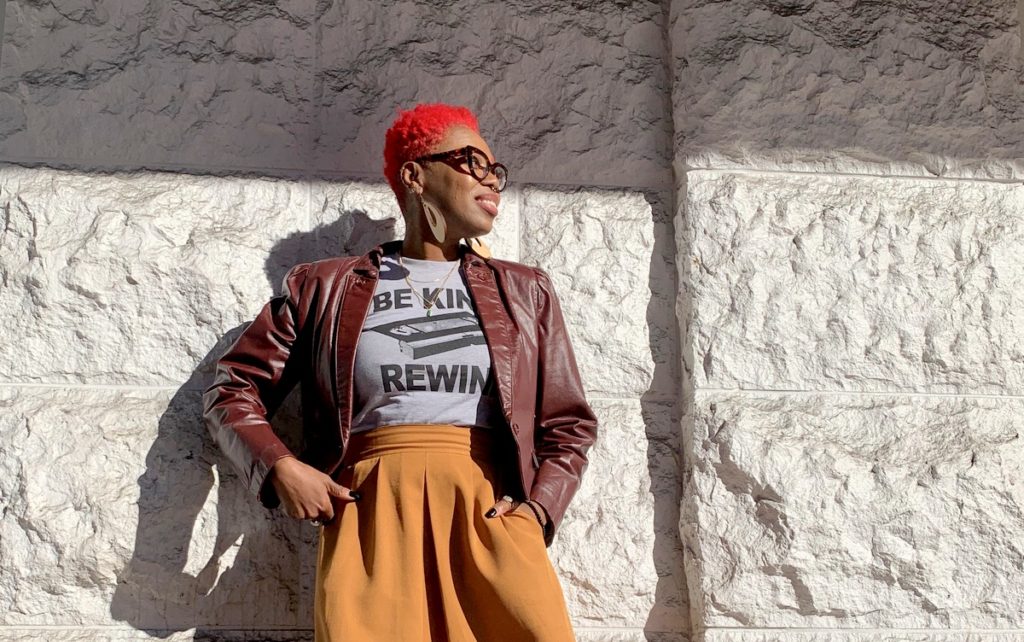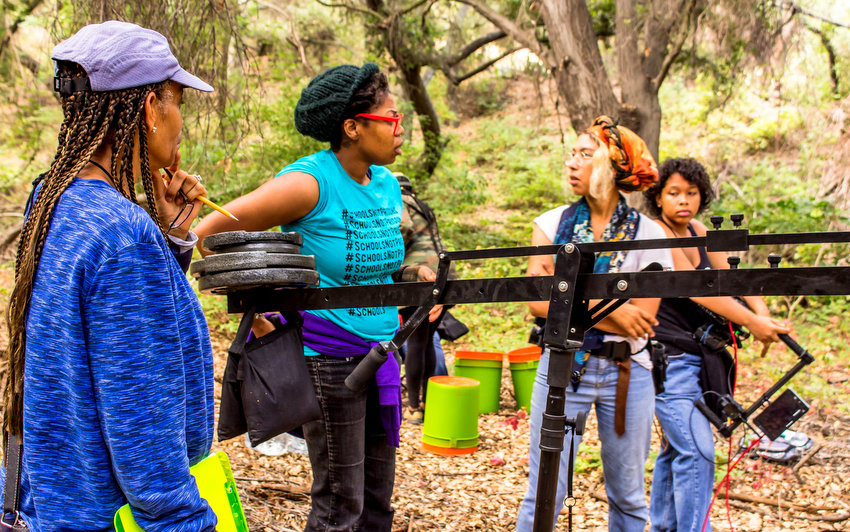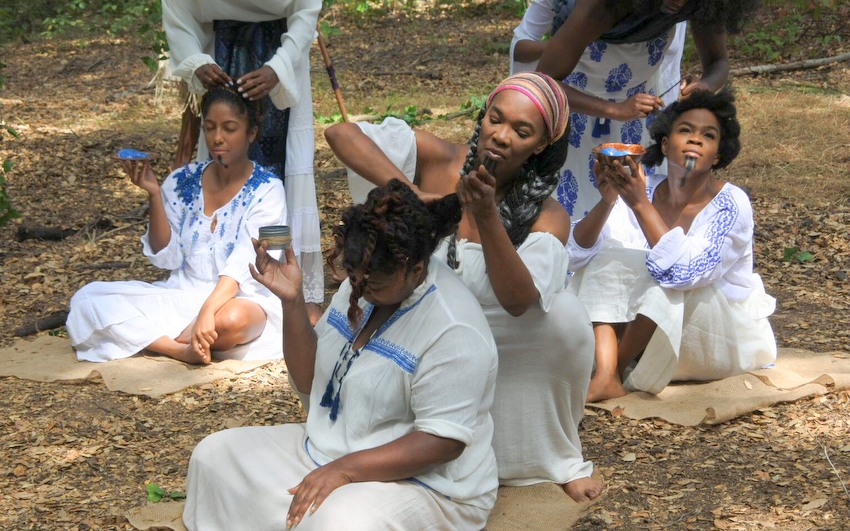
Ashunda Norris had to go back to work full-time in 2016, but was determined to make a film. To keep herself on track art wise, she vowed to write and shoot a quality film while working full time. Norris knew she wanted the story to be about Black womyn, but she didn’t know in what aspect. After months of reading, researching and watching films, she landed on a story she knew she could write and definitely shoot.
Ashunda shares, “I wanted to create a world where Black womyn loved each other and placed their needs first. I was also in the midst of mourning my paternal grandmother and wanted honor her in some way that felt tangible. During pre-production, my maternal grandmother became an Ancestor as well, so I was pouring a lot of grief and love into the film. I feel as though Black womyn deserve a world of their own and worked hard to create my version of what that can look like.“
Ashunda shares, “The genesis of MINO: A Diasporic Myth began when I kept seeing hashtags such as #trustBlackwomen, #loveBlackwomen, #thankyouBlackwomen along with articles written by non-Black womyn full of exalting odes to us while my personal life remained the same because I felt neither trusted, fully loved or thanked by anyone except other Black Womyn. I wanted the planet to be solely owned and nourished by the sacred feminine of the African woman. My response to those empty narratives and the quest for a world I’ve often craved is MINO: A Diasporic Myth.“
Related Story: Case Study: The Making of MINO: A Diasporic Myth by Ashunda Norris
indieactivity : Did you start writing with a cast (You or any) in mind?
Ashunda Norris : I don’t start with a cast in mind at all when I’m writing. I focus on character and story first and all else follows.
indieactivity : How long did you take to complete the script? (Do you have a writing process?)
Ashunda Norris : From conception to birthing the most recent script MINO took a total of 8–10 months. My writing process is chaotic and bizarre, a bit neurotic, but it works for me with my most current schedule. I usually mull over ideas and narrow down stories to two or three. I also research and go down rabbit holes, let myself get lost and then find my way again. My stories usually break at the most inopportune times; while I’m driving or taking a bath or cooking. I rush to get the breakthrough down on some paper or in the notes on my phone and when I have longer moments, I dive in. I’ve had characters talk while I’m trying to get some laundry done. It’s wild. I’ve learned to accept that this is just how its gon’ go with me and my creating. Ideally, I’d love more time to sit and ponder over work, but I get the time in pockets and take full advantage of those small windows.

indieactivity : When did you form your production company – and what was the original motivation for its formation?
Ashunda Norris : I formed it back in 2012/2013 and my original motivation was to have a place to house and archive my art as an indie filmmaker.
indieactivity : What was the first project out of the gate?
Ashunda Norris : Schoolhouse Jailbreak. A chase short I made in film school. My very first film and I’m so proud of it, with all its imperfections and obvious first time filmmaker vibe. I wasn’t always proud of my work. It took me years to accept that part of the journey, the part where my art isn’t quite measuring up to what’s in my head. I honor all of my films and what each of them taught me about the craft of filmmaking and about myself.
indieactivity : During production, what scene (that made the cut) was the hardest to shoot?
Ashunda Norris : The lovemaking scene. I originally intended for it to be more elaborate, more detailed, and definitely longer. I decided to reshoot it and it was still a challenge. We were working up against time and the actors’ comfort level. As a director, I learned that I have to take even more moments, be even more meticulous and really get the choreography down for sexual scenes.
indieactivity : What works better in this latest production that mightn’t have worked so well in the last one you did?
Ashunda Norris : We had more days to shoot and more stellar equipment. This did not eliminate challenges, but these aspects helped us to get visually stunning scenes that mirrored the goals in my brain.
indieactivity : You produced and directed the film, what measure of input did it take to don these hats?
Ashunda Norris : It took a lot of patience, sleepless nights and busy weekends. I produced out of necessity, to get the film done. I chose not to keep waiting on finding a producer to helm the project because I had a specific deadline in mind of when I wanted to start shooting and we were getting super close. I just buckled down and produced the film myself. I had to keep the producer hat on the bottom of my head and the director hat smashed on top when it was time to start shooting. It took the whole of myself, my entire being to keep going and get it done

indieactivity : Is there anything about the independent filmmaking business you still struggle with?
Ashunda Norris : Getting my work seen by audiences far and wide has been a challenge. I’m currently on the film festival tour which has been grand because I get to meet and connect with people who see value in the art that I make. Getting finances to create my art is the ultimate challenge.
indieactivity : Where do you think your strengths line as a filmmaker?
Ashunda Norris : My favorite parts of filmmaking are the conceiving of an idea, writing it and getting to set to direct. I also adore the pre-production phase when my DP Josh Carrasco and I are talking mood, story and shot composition. These are also my biggest strengths: writing, directing, and vision.
indieactivity : Let’s talk finance, How did you finance the film?
Ashunda Norris : I financed the film myself with my own monies I saved up over time.
indieactivity : How much did you go over budget? How did you manage it?
Ashunda Norris : Woooo! Quite a lot. I managed it by simply structuring my needs of the film from my wants.
indieactivity : How important is marketing? Do you think a project can make any dent without it these days?
Ashunda Norris : Marketing and PR is so key. I believe a project needs it along with a great story and intriguing film.
indieactivity : What do you hope audiences get from your film?
Ashunda Norris : I hope that Black womyn feel seen and valued and loved. My intention with MINO was to show Black queer womyn loving each other in the most tender, sensual ways, but also challenging each other’s belief systems. Cinema has the potential to provide alternative worlds we can believe in and want to inhabit. It is my hope that my film has contributed to this notion.
indieactivity : What else have you got in the works?
Ashunda Norris : I’m currently in conception mode. Mulling over ideas, researching and letting my mind wander off, go down tunnels and find my way through to the other side.
Tell us what you think of the interview with “Ashunda Norris” What do you think of it? What ideas did you get? Do you have any suggestions? Or did it help you? Lets have your comments below and/or on Facebook or Instagram! Or join me on Twitter @oladapobamidele
Follow Ashunda Noris on Social Media
Website
IMDb
Facebook
Twitter
Instagram
Vimeo
In Camera by Naqqash Khlalid Launch on VOD April 29
Naqqash Khlalid’s Directs Nabhan Rizwan. In Camera stars an EE BAFTA Rising Star Award Nominee.
2025 Philip K. Dick Sci-Fi Film Festival Award Winners Announced
Vanessa Ly’s Memories of the Future Awarded Best PKD Feature
Dreaming of You by Jack McCafferty Debuts VOD & DVD for April Release
Freestyle Acquires “Dreaming of You” for April 15th Release
Hello Stranger by Paul Raschid set for London Games Festival & BIFFF
The film Is set for an April 10th Premiere at The Genesis Cinema in London (LGF) and BIFFF
Daydreamers Official Trailer by Timothy Linh Bui: Released by Dark Star Pictures
Daydreamers Vietnamese Vampire Thriller – May 2nd release
Afternooner by The Harrow Brothers: Funniest Movie of the Decade on VOD & DVD April
Freestyle Acquires “Afternooner” for April Release









